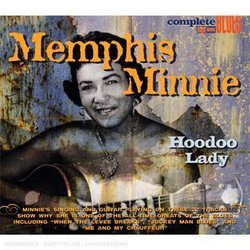Minnie's Blues
Robin Friedman | Washington, D.C. United States | 06/22/2005
(5 out of 5 stars)
"Memphis Minnie (1897 -1973) was one of the greatest of the women blues singers and, indeed, in a male-dominated field one of the greatest of all blues singers. She possessed musical talent, learning the guitar as a child and continuing to record and perform until ill health forced her retirement in 1959. She wrote much of her own material and performed with great skill on the guitar. Minnie recorded hundreds of sides over a thirty year career. He work still brings pleasure to lovers of the blues.
Memphis Minnie's earliest sides were recorded with her husband, Kansas Joe, in Memphis. These sides are accessible on CD, but the songs on the disc under review here date from the mid-30s when Minnie had left Joe and moved to Chicago. This recording is on a large commercial label as part of its "roots and blues" series; and it is an ideal introduction to Memphis Minnie.
The CD consists of 20 songs recorded between 1933 and 1938. Many of the sides remained unreleased and in the vaults of the recording company at the time. Minnie sings with a brassy voice, full of assurance, accompanies herself on the guitar, and performs with a variety of other musicians. I was particularly impressed with the honky-tonk piano featured on songs such as "Down in the Alley' "I hate to see the sun go down" (a variant of "St. Louis Blues") and "Please don't stop him". The clarinet is used with great effects on "Please don't stop him" and "I'm going don't you know". Other tracks feature the mandolin and the use of rhythm blocks. In some of the songs, Minnie uses a highly expressive falsetto ( including "good biscuits", "if you see my rooster" "has anyone seen my man","caught me wrong blues".
Many of the songs are full of sexual double-entendre,particularly those with food or animals as the ostensible theme. In other, more poignant, songs Minnie bemoans the lot of women after abandonment by a cheating man (such as "My baby don't want me no more" and "my strange man". Other songs such as the title of the album "Hoodo Lady" play upon superstitous beliefs (voodo) that remained common at the time in both rural and urban areas. As with the best blues, the songs here are an admixture of rawness, humor, natural musicianship, and sadness.
This is an important CD for those with even a casual interest in the blues. Minnie's roots music, as with the best of the blues, is lively, creative and worth hearing. It documents an important, sometimes neglected, part of the American experience. Paul Garon, author of a biography of Memphis Minnie, "Woman with Guitar" wrote the thorough liner notes for this CD.
Robin Friedman
"
Essential country blues record.
Robert Mohr | Dillon, CO United States | 07/20/2003
(5 out of 5 stars)
"This is an absolute must have for any serious blues collector and any fan of music. I have approximately 100 blues CDs, many from this era and this is easily one of the best 5. Anyone looking to begin a blues collection would be well advised to purchase these great early Memphis Minnie recordings. Her guitar playing may well surpass even the great Tampa Red and her vocals have a more startling and rhythmic quality than female contemporary Bessie Smith."
An Anthology By The Hoodoo Lady
Alfred Johnson | boston, ma | 08/11/2007
(4 out of 5 stars)
"One of the interesting facts about the development of the blues is that in the early days the recorded music and the bulk of the live performances were done by women, at least they were the most popular exponents of the genre. That time, the early 1920's to the 1930's was the classic age of women blues performers. Of course, when one thinks about that period the name that comes up is the legendary Bessie Smith. Beyond that, maybe some know Ethel Waters. And beyond that-a blank.
Yet the blues singer under review, Memphis Minnie, probably had as a productive career as either of the above-mentioned names. And here is the kicker. If you were to ask today's leading women blues singers like Bonnie Raitt or Maria Muldaur about influences they will, naturally, give the obligatory Bessie response, but perhaps more surprisingly will also praise Ms. Minnie to the skies.
This compilation, while not technically the best, will explain the why of the above paragraph. Minnie worked with many back up players over the years, some good some bad, but her style and her energy carried most of the production. She was the mistress of the double entendre so popular in old time blues- you know phrases like `put a little sugar in my bowl'. The best of the bunch here are the title song "Hoodoo Lady", "Ice Man", "I'm A Bad Luck Woman" and "Butcher Man". I went wild over her sensuous version of "Bumble Bee". If you have heard "Big Mama" Thornton's version you will love this one as well. However, the real deal here is that this is an album you acquire a taste for-and then do not want to turn the damn thing off. That, for me, is high praise indeed.
"


 Track Listings (22) - Disc #1
Track Listings (22) - Disc #1